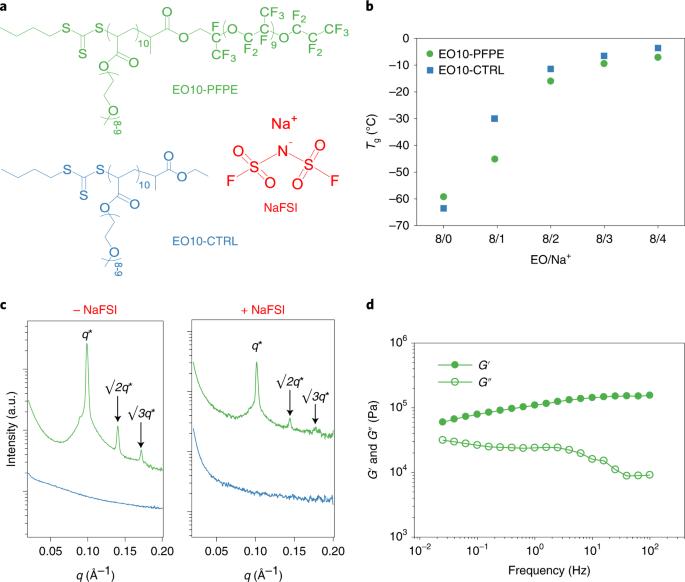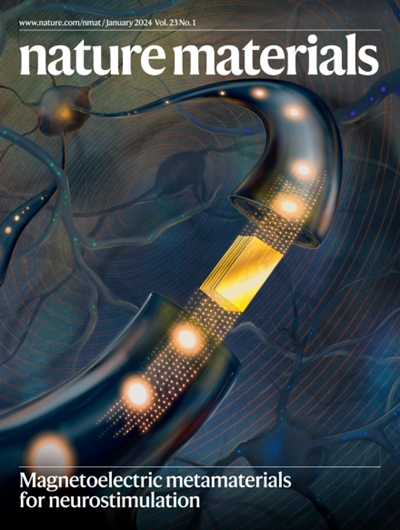Ultra-stable all-solid-state sodium metal batteries enabled by perfluoropolyether-based electrolytes
IF 38.5
1区 材料科学
Q1 CHEMISTRY, PHYSICAL
引用次数: 35
Abstract
Rechargeable batteries paired with sodium metal anodes are considered to be one of the most promising high-energy and low-cost energy-storage systems. However, the use of highly reactive sodium metal and the formation of sodium dendrites during battery operation have caused safety concerns, especially when highly flammable liquid electrolytes are used. Here we design and develop solvent-free solid polymer electrolytes (SPEs) based on a perfluoropolyether-terminated polyethylene oxide (PEO)-based block copolymer for safe and stable all-solid-state sodium metal batteries. Compared with traditional PEO SPEs, our results suggest that block copolymer design allows for the formation of self-assembled nanostructures leading to high storage modulus at elevated temperatures with the PEO domains providing transport channels even at high salt concentration (ethylene oxide/sodium = 8/2). Moreover, it is demonstrated that the incorporation of perfluoropolyether segments enhances the Na+ transference number of the electrolyte to 0.46 at 80 °C and enables a stable solid electrolyte interface. The new SPE exhibits highly stable symmetric cell-cycling performance at high current density (0.5 mA cm−2 and 1.0 mAh cm−2, up to 1,000 h). Finally, the assembled all-solid-state sodium metal batteries demonstrate outstanding capacity retention, long-term charge/discharge stability (Coulombic efficiency, 99.91%; >900 cycles with Na3V2(PO4)3 cathode) and good capability with high loading NaFePO4 cathode (>1 mAh cm−2). Rechargeable batteries with sodium metal anodes are promising as energy-storage systems despite safety concerns related to reactivity and dendrite formation. Solvent-free perfluoropolyether-based electrolytes are now reported for safe and stable all-solid-state sodium metal batteries.

利用全氟聚醚电解质实现超稳定全固态钠金属电池
与钠金属阳极配对的可充电电池被认为是最有前途的高能量、低成本储能系统之一。然而,高活性金属钠的使用和电池运行过程中钠枝晶的形成引起了安全问题,尤其是在使用高易燃性液体电解质时。在此,我们设计并开发了基于全氟聚醚封端聚氧化乙烯(PEO)嵌段共聚物的无溶剂固体聚合物电解质(SPE),用于安全稳定的全固态钠金属电池。与传统的 PEO SPE 相比,我们的研究结果表明,嵌段共聚物的设计允许形成自组装纳米结构,从而在高温下获得高存储模量,即使在高盐浓度(环氧乙烷/钠 = 8/2)条件下,PEO 结构域也能提供传输通道。此外,研究还表明,加入全氟聚醚片段后,电解质的 Na+ 传递数在 80 °C 时提高到了 0.46,从而形成了稳定的固体电解质界面。新的固态电解质在高电流密度(0.5 mA cm-2 和 1.0 mAh cm-2,长达 1,000 小时)条件下表现出高度稳定的对称电池循环性能。最后,组装好的全固态钠金属电池具有出色的容量保持能力、长期充放电稳定性(库仑效率为 99.91%;Na3V2(PO4)3 阴极循环 900 次)以及高负载 NaFePO4 阴极的良好性能(1 mAh cm-2)。使用钠金属阳极的可充电电池作为储能系统前景广阔,尽管存在与反应性和枝晶形成有关的安全问题。现在有报告称,无溶剂全氟聚醚基电解质可用于安全稳定的全固态钠金属电池。
本文章由计算机程序翻译,如有差异,请以英文原文为准。
求助全文
约1分钟内获得全文
求助全文
来源期刊

Nature Materials
工程技术-材料科学:综合
CiteScore
62.20
自引率
0.70%
发文量
221
审稿时长
3.2 months
期刊介绍:
Nature Materials is a monthly multi-disciplinary journal aimed at bringing together cutting-edge research across the entire spectrum of materials science and engineering. It covers all applied and fundamental aspects of the synthesis/processing, structure/composition, properties, and performance of materials. The journal recognizes that materials research has an increasing impact on classical disciplines such as physics, chemistry, and biology.
Additionally, Nature Materials provides a forum for the development of a common identity among materials scientists and encourages interdisciplinary collaboration. It takes an integrated and balanced approach to all areas of materials research, fostering the exchange of ideas between scientists involved in different disciplines.
Nature Materials is an invaluable resource for scientists in academia and industry who are active in discovering and developing materials and materials-related concepts. It offers engaging and informative papers of exceptional significance and quality, with the aim of influencing the development of society in the future.
 求助内容:
求助内容: 应助结果提醒方式:
应助结果提醒方式:


